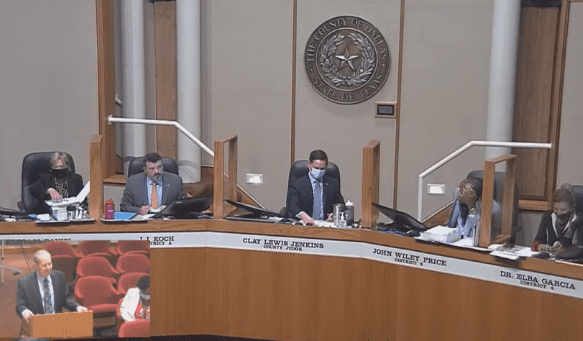Dallas County’s new elections administrator continues to take criticism over allegations of mismanagement that may cost his office more than a million dollars, but he’s also drawing support from critics of his controversial predecessor.
At last week’s Dallas County Commissioners Court meeting, Elections Administrator Michael Scarpello was in the hot seat over his handling of the May 1 municipal elections—his first since taking over the county’s troubled Elections Department in December from Toni Pippins-Poole, who retired at the end of last year following a nine-year tenure marred by mistakes and allegations of incompetence and corruption.
“I want to apologize to the commissioners court and, more importantly, to the voters of Dallas County for the performance we had on Election Day,” Scarpello said. “That’s certainly not the level of performance we expect.”
The week before, the city of Dallas refused to pay Scarpello’s elections office an additional $1.4 million to conduct June 5 runoffs (underway now), citing his “egregious failure” administering the May election. Chief among the complaints were polling-place problems that kept an unknown number of voters from casting ballots on Election Day.
“I’m just amazed at the number of issues,” Commissioner John Wiley Price said. “How do we keep the confidence of the electorate with performance like that? What changed with regards to this election?”
An 11-page Post-Election Review prepared by the Elections Department and presented to commissioners documented hundreds of Election Day polling-place problems. Most of the issues were tied to equipment, supplies, and a shortage of trained poll workers, as well as issues with the system used to respond to poll workers’ calls for help.
The review said the department “encountered the typical poll opening problems most election offices face, but those problems were magnified publicly when several Vote Centers didn’t open for several hours, which is an unacceptable level of performance.”
“This situation exasperated certain officials because some of these opening issues took place in districts where there were highly competitive, high-profile races.”
“This is the first time since I’ve been here that I’ve seen this kind of analysis of an election,” said Commissioner Elba Garcia.
The review listed specific issues experienced with a dozen different Election Day systems and processes, along with short- and long-term plans to address them.
“We didn’t have these kinds of issues in the largest election this county has had,” Price told Scarpello. “The only thing that’s different is you.”
That’s not accurate.
According to the review, the 2021 election was “the largest May Joint Election in the County’s history.”
It was conducted for 1.3 million voters and utilized 58 Early Voting vote centers and 432 Election Day vote centers. To staff those vote centers, an unprecedented 2,000 poll workers were recruited and employed on this May Election Day.
The review described 17 modifications Scarpello made in advance of the May election to mitigate major issues that existed throughout the department when he took over, including during the 2020 presidential election under Pippins-Poole.
One of the biggest challenges—and one Scarpello didn’t have the option to change—was the number of Election Day voting locations.
In 2019, when the county decided to change from using precinct polling places on Election Day to countywide vote centers (allowing voters to cast ballots at any polling place within the county), commissioners agreed to a plan to keep using the same number of voting locations in all future elections.
That meant recruiting poll workers for nearly 100 more voting sites than in past local elections, which Scarpello said is much more difficult for a Saturday in May than for a November general election.
“It’s our fault,” said Commissioner J.J. Koch. “We decided to implement the vote center system in anticipation of 2020.”
“We set them up for failure” by requiring the Elections Department to set up “an ungodly number” of Election Day vote centers “in an election few people cared about,” Koch said.
Koch said the problems “need to be thoroughly worked through,” but the overall error rate was low.
“There’s no arguing those instances happened, but the number of sites with problems is pretty low,” he said.
Koch, the lone Republican on the court, was a longtime critic of the Elections Department’s performance under Pippins-Poole.
In just her last year heading the department, Pippins-Poole and her staff misplaced thousands of primary ballots that went uncounted for a week and sent out improperly printed mail-ballot envelopes despite advice from the postal service.
Problems continued into the November general election, including more mail-ballot misprints and delays sending out mail ballots, concerns about getting equipment to polls, electronic pollbook errors, questionable curbside voting practices, poll watchers being blocked, and the county’s perennial challenge of finding enough poll workers and properly training last-minute recruits.
“I absolutely think because of sloppiness, because the Elections Department was constantly behind the eight ball, there were little mistakes,” Koch said at a November 13 commissioners court meeting.
Price, on the other hand, was rarely critical of Pippins-Poole, a longtime friend he helped elevate to the top elections position in 2011, after County Judge Clay Jenkins orchestrated the ouster of her then-boss, widely respected administrator Bruce Sherbet.
While general oversight of the department falls to commissioners court, hiring and overseeing elections administrators is the job of a county Election Commission made up of the county judge, county clerk, and tax-assessor-collector (all positions held now by the same Democrats who hired Pippins-Poole), plus chairs of the county’s Democrat and Republican parties.
Yet the Election Commission never met during Pippins-Poole’s tenure or conducted a review of her performance.
“Mr. Scarpello needs to have our full support,” experienced Dallas County election worker Susan Fountain told commissioners during public comments.
The conservative activist and state Republican Party representative frequently speaks at court meetings on election integrity issues.
“Having been an election judge, clerk, and poll watcher, I have witnessed firsthand the incompetence of the system by which we’ve had to work under the last elections administrator and have so stated in commissioners court,” Fountain said.
She called out the “insanity of wasting $26 million” of taxpayers’ money to provide voting centers in every precinct and said there were four voting locations along the same six-block street in the precinct where she worked as an election judge.
That, “along with the compromising of flash drives on the way to central count in past elections, is indicative of what has been broken in this elections department.”
“Did we hear one peep of pushback from the commissioners court? It was crickets when I called it to your attention,” she said. “And here we have a commissioner attacking the first person who is trying to right this sinking ship in the 10 years since we lost Bruce Sherbet.”
“We need to stand behind our new elections administrator and let him fix the mess that Toni Pippins-Poole left. But it’s not going to happen in six months,” she added. “This is what we hired him for, not to perpetuate the status quo.”
In addition to problems with equipment and supplies, recruiting election workers, and tracking help desk calls, Scarpello identified training as a major issue.
“We’re going to throw out our entire training manual and start over,” he said.
Scarpello’s review also noted 11 vacancies within the department, including the deputy elections administrator and four key management positions.
A third and final phase of the Election Department’s comprehensive internal review will include an analysis of the organization’s personnel, processes, procedures, vendors, facilities, software, and technical infrastructure.
Scarpello is expected to present that analysis plus a long-term strategic plan to the commissioners court and the Election Commission in the summer of 2021, after management staff has been hired to assist in the review.
Information about Dallas County elections, including the June 5 runoffs, can be found on the Dallas County Elections Department website.





